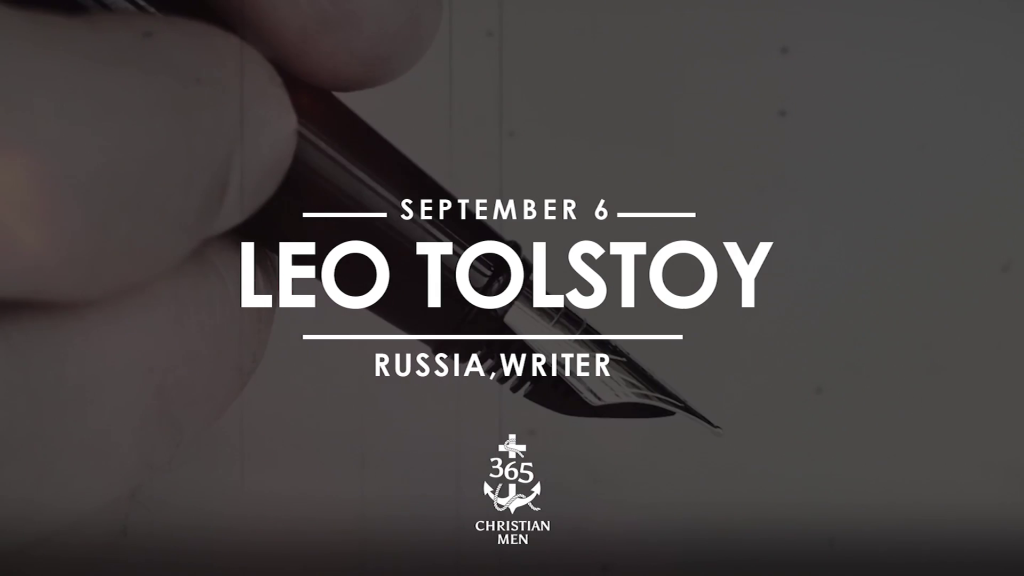September 6. Leo Tolstoy. Tolstoy was a Russian writer—one of the greatest authors of all time. He wrote two of the world’s most acclaimed works of fiction: War and Peace and Anna Karenina.
In the 1870s, he experienced a profound moral crisis and a spiritual awakening. His literal interpretation of the ethical teachings of Jesus, which centered on the Sermon on the Mount, led him to become a Christian.
We all have sins to give up, commands to obey, promises to believe. So be intentional.
The golden flame of a candle flickered and cast a warm hue over the silent study. The only sound in the room was the tip of Tolstoy’s pen moving rapidly across the page of his journal, where he was capturing a flurry of thoughts, as had been his habit since his teenage years.
He wrote, “Five years ago, I began to believe in the teaching of Christ.” He wrote that Christ’s teachings had changed him greatly. Now, he no longer cared about things he used to treasure. And his desires changed, too. The whole aim and purpose of his life had changed.
Tolstoy looked up from his journal and looked at the collection of books scattered across his desk. He read. Quickly moving from text to text, from commentary to commentary, from translation to translation, he mulled over the passage of Scripture known as The Sermon on the Mount. With the focus of a criminal investigator, Tolstoy read the passage. He read it again. And he read it again.
He felt that if there were any clear and definite precepts of Christianity, they must have been expressed in this sermon, and in those three chapters of Saint Matthew’s Gospel he sought the solution to his doubts.
And then it happened. He remembered a passage he had overlooked many times. “But I say, do not resist an evil person! If someone slaps you on the right cheek, offer the other cheek also” (Matthew 5:39 NLT).
He hurried to write this onto a fresh page of his open journal.
For years, Tolstoy searched the Scriptures for a deeper meaning than the established Church had offered. He longed for some way to resolve the conflict that he saw between the literal words of Christ and what the Orthodox Churches now taught.
He recorded these thoughts in the pages of his journal: “What perplexed me most … [was] … the evil things that men do … [and some of these] were justified by the Church. I saw that the teaching of Christ, which teaches us humility, tolerance, forgiveness, self-denial, and love, was verbally extolled by the Church, but … [the Church sanctioned behavior] incompatible with such teaching.”
“A Christian can only transmit the knowledge of the truth to others by keeping away from the error they are in, and by returning good for evil,” he wrote.
As he closed his journal and set down his pen, Tolstoy considered the revelation God had shown him about overcoming evil with good, of not returning evil for evil. He thought about how his life and his values had to change to line up with these words of Jesus. And he committed to spend the rest of his days pursuing this new standard for his life. He committed to it; he knew it would not happen by accident. It would not be easy. But he would do it.
“Do not be overcome by evil, but overcome evil with good” (Romans 12:21 NIV).
How are you inspired to follow Tolstoy’s example in your own life? We all have sins to give up, commands to obey, promises to believe. So be intentional.
Golgonooza. “The Kingdom of God is Within You by Leo Tolstoy.” Humandivinedotorg. May 1, 2016. https: //thehumandivine.org/2016/05/01/the-kingdom-of-god-is-within-you-by-leo-tolstoy.
Story read by: Peter R Warren, https://www.peterwarrenministries.com/
Introduction read by: Daniel Carpenter
Audio production: Joel Carpenter
Story written by: John Mandeville, https://www.johnmandeville.com/
Editor: Teresa Crumpton, https://authorspark.org/
Project manager: Blake Mattocks
© 2020, 365 Christian Men. LLC. All rights reserved.





